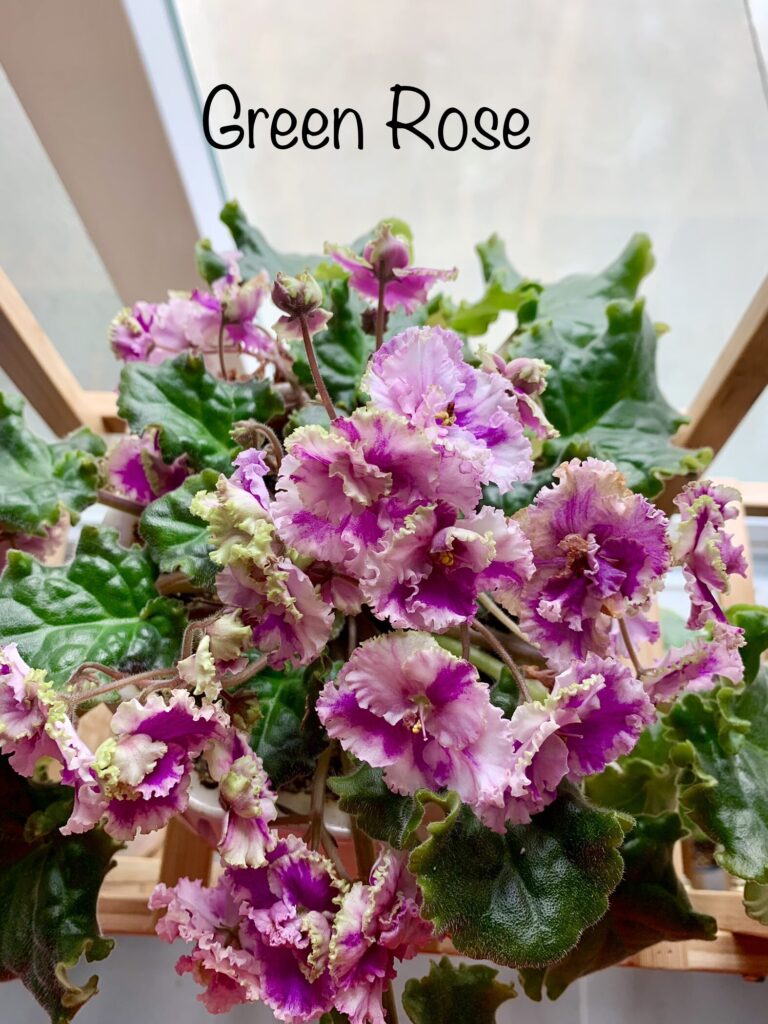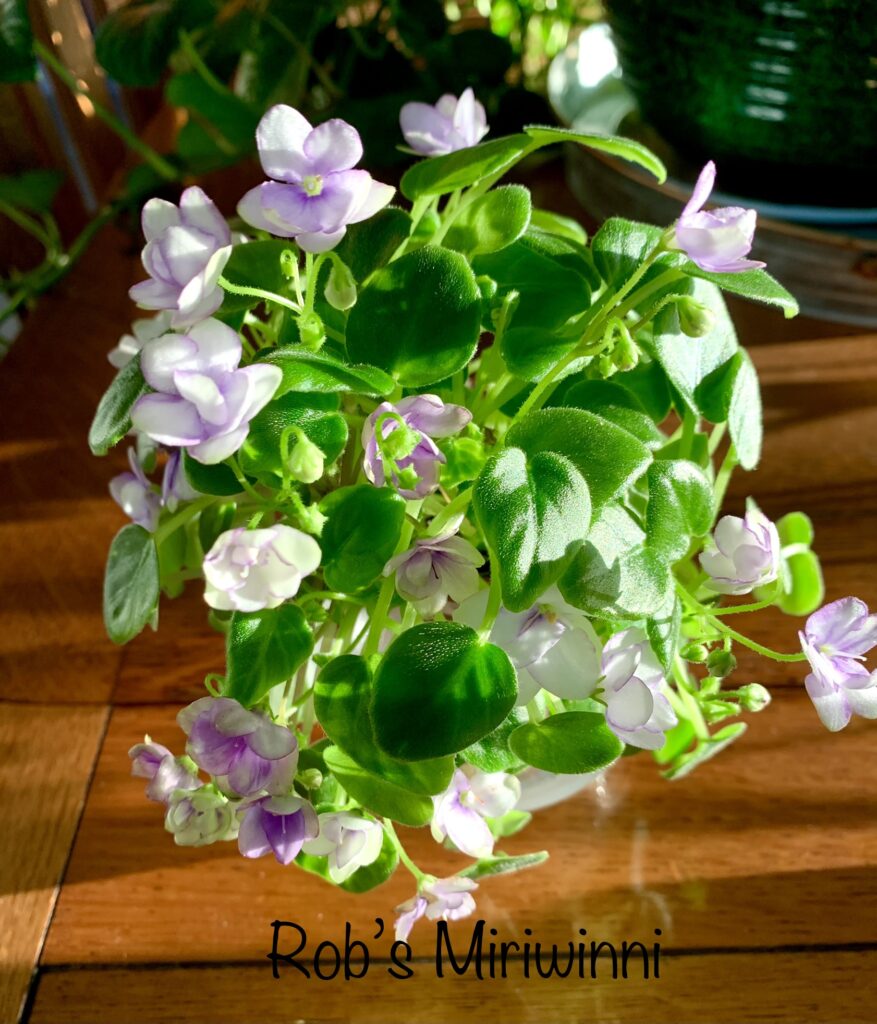
As a gardener, you know that finding the right potting soil for your plants is crucial to their growth and survival. African violets, with their delicate blooms and unique soil requirements, are no exception. In this blog post, we will explore the best potting soils for African Violets. The components of soil that nature uses, why airiness is necessary in a potting mix. And lastly the African Violet potting soil recipe that I have used for years.
Commercial African Violet Potting Soil: Advantages and Disadvantages
When it comes to convenience, commercial African Violet potting soils are hard to beat. Packaged, ready-to-use, and specifically formulated for the needs of these particular plants, they take the guesswork out of soil preparation. These soils are often enriched with nutrients essential for the growth and blooming of African violets, such as nitrogen, phosphorus, and potassium.
However, there are a few potential drawbacks to consider. Commercial soils can be more expensive than creating your own mix, especially if you have a large collection of African violets like I do. Additionally, the quality of commercial soils can vary widely. Some mixes may retain too much moisture, leading to root rot, while others might not hold enough. Lastly, commercial mixtures may contain unnecessary additives or lack specific nutrients that your African violets may need for optimal growth.
Remember, every African Violet is unique and may have different soil preferences. Finding the right soil often involves a bit of trial and error, whether you choose to use a commercial mix or make your own.
Mimicking the Natural Soil of African Violets
In their native habitat of Tanzania and Kenya, African violets flourish in the crevices of highland mountains, where the soil is light, porous, and rich in organic matter. To replicate this environment at home, consider creating a potting mix that simulates these conditions.
Start with a base of 2 parts of high-quality peat moss. Peat moss is light and airy, which mimics the loose soil structure African violets are used to. It also retains moisture well, ensuring your plants have a consistent water supply. To this, add 1 part perlite and 1 part vermiculite. These elements help improve drainage and prevent the soil from compacting, which can hinder root growth.
Remember, while this recipe aims to replicate the natural conditions of African violets, it’s essential to monitor your plants and make adjustments as needed. After all, each African violet is unique and may have specific requirements that need to be met for it to thrive. As you gain experience, you’ll learn what works best for your plants and be able to create the perfect potting soil mix.
Air is a vital component of a potting mix for African violets because it allows excess water to drain quickly and ensure the roots can breathe. Without sufficient air, the roots may suffocate and eventually die. When potting African violets, it is important to combine soil and perlite to create a loose and well-draining soil structure. Vermiculite is another option you can use as part of the potting mix to improve soil drainage for healthy root growth.
Maintaining Soil pH for African Violets
African violets prefer slightly acidic soil, with a pH in the range of 6.5 to 7.0. A pH that falls within this range encourages the plant to effectively absorb nutrients from the soil. If the pH is too high (alkaline) or too low (acidic), it can lock nutrients within the soil, making it difficult for the African violet to access them.
Peat moss is famous for becoming more acid as time passes and vermiculite can vary in pH. Also the water you use and the build of salt and minerals in soil can alter the pH over times. This is why yearly repotting is an easy fix to maintain proper pH levels and continue growing healthy, happy African Violets.
Pasteurizing Your Soil Mix: How To Do It and The Pros and Cons
Pasteurizing your soil mix is one method used by gardeners to kill harmful pathogens, weed seeds, and pests. It involves heating the soil to a temperature that is high enough to kill these harmful elements, but not so high that beneficial microorganisms are destroyed.
To pasteurize your soil at home, preheat your oven to 180-200°F (82-93°C). Place your soil mix in a baking dish or oven-safe pot, and insert a thermometer into the center of the soil. Monitor the temperature closely. Once it reaches 180°F, maintain this temperature for at least 30 minutes. Allow the soil to cool before using it.
The primary advantage of pasteurizing your soil is that it can help ensure a clean, disease-free environment for your African Violets. It can be particularly beneficial if you’re reusing old potting mix or if you suspect your mix may be contaminated.
However, there are some downsides to consider. Pasteurizing your soil can be a time-consuming process, and it requires careful monitoring to prevent overheating, which can cause the soil to become hard and compacted. Also while this method kills off harmful organisms, it also eliminates beneficial ones, which are important for maintaining soil health and fertility.
If you are adding organic material to your potting mix then pasteurizing is a good choice. Although when your mixture contains only inorganic sterile ingredients like perlite, vermiculite and peat moss then pasteurization is not needed.
Remember to weigh these pros and cons and consider the specific needs and health of your plants before deciding to pasteurize your soil mix.
I personally do not pasteurize my soil as I use only sterile ingredients and have never had an issue in all my 30+ years of growing.
African Violet Potting Soil Recipe
Creating the ideal soil mix for your African violets can have a significant impact on their health and vitality. Here’s the simple African Violet potting soil recipe I use and have for years. I actually got it from my Father who got it from his Mother and believe me they both had the most beautiful African Violets!!
- Peat Moss: Start with a base of high-quality peat moss. It should make up 50% of your soil mix. This component is light and airy, mimicking the loose soil structure African violets are accustomed to in their natural habitat. It also retains moisture well, providing a consistent water supply for your plants.
- Perlite: Add perlite to the mix, accounting for 25% of the total. Perlite will enhance the drainage capabilities of the soil and prevent it from compacting, which could hinder root growth.
- Vermiculite: The remaining 25% of your soil mix should be vermiculite. This component further improves soil drainage and helps to maintain a light, well-aerated soil structure conducive to healthy root development.
Mix these ingredients thoroughly to ensure a uniform blend. This mix will provide a light, well-draining soil that mimics the natural growing conditions of African violets. Remember to observe your plants and adjust the recipe as needed. Your African violets are unique and may have specific soil requirements that need to be met for them to thrive.
Happy Gardening!
Creating the right potting soil for African violets requires attention to detail and the proper components. Knowing what potting soil African violets need is essential along with knowing the components of soil nature uses to grow these plants. A well-draining, nutrient-rich soil mixture is essential to promote healthy plant growth. With these tips, you can create a potting mix that your African violets will love and bloom for years to come.
Please be sure to check out my Gardening Blog Post Page for more tips on all types of gardening. Including Seed Saving, Seed Starting, Orchids, Water Gardening, Coldframe Gardening, Indoor Bulb Gardening, Hydroponics, Container Gardening, Mums, Herbs, African Violets, planting Bulbs, Flower Gardening, Vegetable and Fruit Gardening, Indoor Houseplants of all kinds, Cactus, Succulents, Hanging plants, Deer resistant plants and even Bird, Bee, Butterfly and Hummingbird Gardens!

